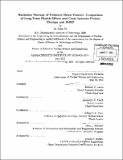Radiation therapy of pediatric brain tumors : comparison of long-term health effects and costs between proton therapy and IMRT
Author(s)
Vu, An T. (An Thien)
DownloadFull printable version (8.933Mb)
Other Contributors
Massachusetts Institute of Technology. Dept. of Nuclear Science and Engineering.
Advisor
Richard C. Lanza, Jacquelyn C. Yanch and George T.Y. Chen.
Terms of use
Metadata
Show full item recordAbstract
Radiation therapy is an important component of pediatric brain tumor treatment. However, radiation-induced damage can lead to adverse long-term health effects. Proton therapy has the ability to reduce the dose delivered to healthy tissue when compared to photon radiation therapy, but this dose benefit comes at a significantly higher initial cost, as proton therapy is 2 to 3 times more expensive to deliver than photon therapy. This thesis provides a framework for the evaluation of health and cost effectiveness of proton therapy compared to Intensity Modulated Radiation Therapy (IMRT). Proton therapy and IMRT treatment plans of patients treated for low-grade gliomas (LGGs) were analyzed to provide risk estimates of long-term health effects based on the dose distributions. A Markov simulation model was developed to estimate the health effects and costs of proton therapy and IMRT. The model tracked a pediatric cohort treated for LGGs at age 5. In the model, the patients were at risk of acquiring IQ loss, growth hormone deficiency (GHD), hypothyroidism, hearing loss, and secondary cancer. Patients faced risks of death due to tumor recurrence, secondary cancer, and normal death. In addition, a review of literature was performed to estimate the costs and additional health risks not determined from the patient treatment plans. The simulation results show that proton therapy can be cost effective in the treatment of LGGs based on the health risks estimated from the patients treatment plans. The cost associated with IQ loss and GHD were the main contributors to the total costs from long-term health effects. Proton therapy also results in a lower level of IQ loss and a lower risk of acquiring other long-term health effects. However, the relative difference in IQ point loss between the treatment modalities is small in the limited number of patients studied. There is a need to further investigate the advantages of proton therapy in reducing the dose delivered to the relevant parts of the brain to lower the risks of adverse health effects, especially for IQ loss.
Description
Thesis (S.M. in Technology and Policy)--Massachusetts Institute of Technology, Engineering Systems Division, Technology and Policy Program; and, (S.M.)--Massachusetts Institute of Technology, Dept. of Nuclear Science and Engineering, 2011. Cataloged from PDF version of thesis. Includes bibliographical references (p. 101-109).
Date issued
2011Department
Massachusetts Institute of Technology. Department of Nuclear Science and Engineering; Massachusetts Institute of Technology. Engineering Systems DivisionPublisher
Massachusetts Institute of Technology
Keywords
Engineering Systems Division., Technology and Policy Program., Nuclear Science and Engineering.